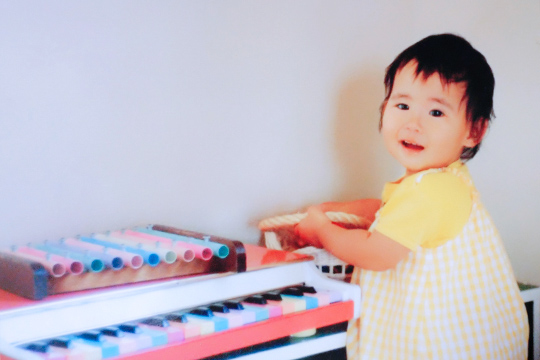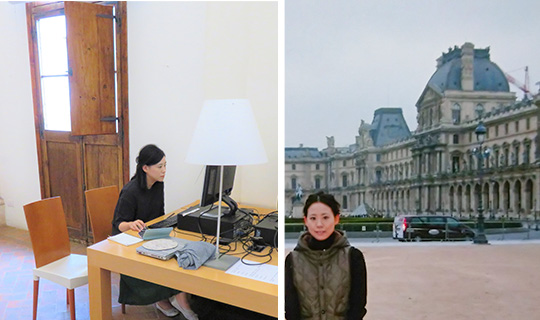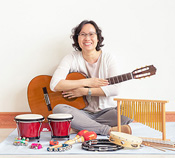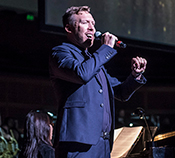History of Music Therapy as an Approach to Understanding Music.
(Part 1)
Yuki Mitsuhira / Researcher specializing in the history of music therapy
The History of Music Therapy has Gained Little Recognition in Japan.
Where did music therapy originate and how far does it date in Japan? Yuki Mitsuhira, a researcher specialized in the history of music therapy, is trying to find answers to these questions. How did she discover music therapy and what drew her into its history? She told us about her journey as a music therapist and academic.
A friend under hospice care told me about music therapy.
Do you know history of music therapy as an academic field? Many people in Japan are unaware of the depth to which historians have studied the therapeutic use of sounds and music for promoting wellbeing and treating psychological and somatic disorders. My journey to where I am today in this field started from my relationship with music, that dates all the way back to early childhood.
As a toddler, I was very responsive to the sounds in my surroundings. I used to mimic the music played on TV and copy the cooking sounds my mother made in the kitchen. My parents decided to start me on piano lessons when I was only three. Learning the basics was hard work, as most of the children at the music school were older than me, with more advanced verbal skills. Determined to make music with them, I quickly picked up a few tunes. For the first few years playing music was more of a grind than anything else, but in time it became a pleasure. I played all through my youth and majored in piano at a music academy.
During my second year at the academy, I received a phone call from a close friend from my childhood. She had fallen gravely ill and was in hospice care. I knew she was a passionate lover of music, and I was surprised to hear her say over the phone, “I’ve discovered music.”

From playing music to researching it: The search for music’s therapeutic potential.
Shortly after our phone conversation, I visited the hospice care unit to see my dear friend. It was there that I had my first glimpse of music therapy. The caregivers had devised various activities and programs that applied music in ways I had never seen. They played songs and orchestral pieces requested by the patients. They encouraged the patients to play musical instruments themselves to express their emotions. They even had ways to use music as a kind of anesthetic, to help the patients through their pain. There at the hospice, music was both a method of healing and a vehicle of expression for the soul.
“At this hospice,” my friend said, “I’m experiencing music on a totally different plain.” The music she was experiencing in therapy awoke her to a potential in music she had never known. Hearing is usually the longest-surviving function active in a human body when it fails. Sounds can reach the consciousness of a person who is completely paralyzed. This reunion with my music-loving friend, and the innate power of music therapy she spoke of, changed the course of my life. When I turned 21, I switched my major from the piano to musicology and began studying music therapy to explore the “potential in music” my dear friend described.
A quest to find truly healing sounds for patients.
I started playing music in music therapy sessions at elderly care homes and in hospitals, two to three times a week. Most of the pieces we played in the sessions were classical and other genres from the west. After a few months in the field, I began to wonder if Western music was necessarily the most comforting choice for our elderly patients. When we asked the patients to clap their hands and join in the simple ensemble pieces we played them, was Western music therapeutic? Had classical music been familiar to them, or ‘closest to home’ so to speak, back when they were growing up? What other types of music might be more congenial to patients from Japan? These questions hung in my mind.
In pondering those questions over the next few years, my interest gradually shifted to the origins of music therapy. I hoped that better knowledge of the roots and development of music therapy would bring insight. My final thesis at the music academy was on the music therapy of ancient Greece. The Greeks established the founding principles of modern music therapy. I went on, as a researcher, to study the history of music therapy in medieval and modern Europe while assisting with music therapy sessions. While the archival resources on music therapy in Europe were rich and absorbing, I found few opportunities to learn about the history of music therapy at home in Japan. Happily, in time, I had a chance meeting with a professor from the Graduate University for Advanced Studies who taught a class at the International Research Center for Japanese Studies (Nichibunken), an academic institute of diverse expertise and specialists focused on the culture and history of Japan. I thought that Nichibunken would be an ideal place to be if I wanted to research Japanese history of music therapy. I decided to give up my remaining studies at the music academy and transfer to a doctoral course at Nichibunken within the Graduate University for Advanced Studies.

- Yuki Mitsuhira / Researcher specializing in the history of music therapy
- Yuki Mitsuhira took her Ph.D. at the Graduate University for Advanced Studies. She is currently participating in a Nichibunken research project to investigate the history of music therapy. She recently published Music as "Iyashi": Music Therapy and its Ideological Foundations in the Edo and Meiji Periods (Rinsen Shoten, 2018).
Interview Date:



